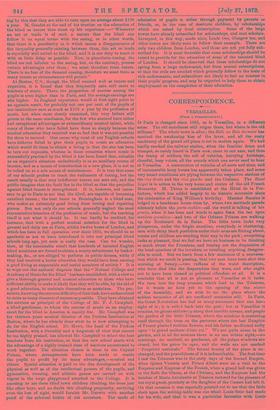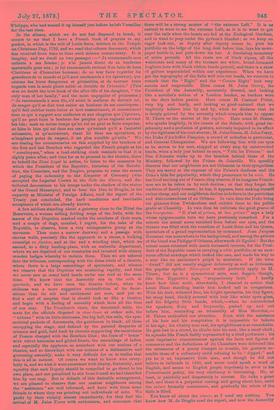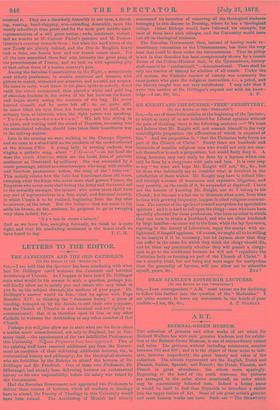CORRESPONDENCE.
IF Paris is changed since 1869, so is Versailles, in a different sense. The old stateliness still reigns there, but where is the old stillness ? The whole town is alive ; the Belle au Bois dormant has received the awakening kiss of the lover, and all the rusty machinery of the grand old place is set in motion again. We had hardly reached the railway station, when the familiar drum and trumpet, so rarely heard in Paris now, came to our ears, and then the tramp of soldiers, the roll of vehicles, hurrying footsteps, cheerful, busy voices, all the sounds which one never used to hear at Versailles. A resurrection of vehicles of all aorta and sizes, and of innumerable bony horses has apparently taken place, and some very smart omnibuses are plying between the respective stations of the rive droite and the rive gauche and the Chateau. The Essai Loyal is in action in the very home and centre of the old French Monarchy. M. Thiers is established at the Hotel de la Prd- lecture, which has added largely to its historic souvenirs since the celebration of King William's birthday. Marshal Bazaine is lodged in a handsome house close by, where two sentinels parade solemnly before the porte-cochere—all the world is talking of his proces, when it has time and words to spare from the tax upon matieres premieres—and two of the Orleans Princes are walking up the Boulevard de la Reine. The little town looks very prosperous, under the bright sunshine, everybody is chattering, men with shiny black portfolios under their arms are flitting about, nurses and children are wending their way to the park ; everything looks so pleasant, that we feel we have no business to be thinking so much about the Prussians, and tracing out the disposition of the head-quarters of the invaders, or recalling anything disagree- able to mind. But we learn from a few sentences of a conversa- tion which we catch in passing, that two men have been shot this morning at Satory,—two ruffians of the worst description, who have died like the desperadoes they were, and who ought not to have been classed as political offenders at all. It is a reminder that all is not so pleasant at Versailles as it looks. We turn into the long avenues which lead to the Trianons, for it wants an hour yet to the opening of the séance of the Assembly, and we wish to see the place where the saddest memories of all are uneffaced memories still. In Paris, the Great Revolution has had so many successors that one loses sight of it ; it is roues back into the past ; but at Versailles it remains, its ghosts still sweep along that terrible terrace, and people the garden of the little Trianon, where the sunshine is scattering itself through the trees on the parterres where the last Dauphin of France planted rootless flowers, and his father meditated sadly upon "le grand malheur d'etre roi." We are quite alone in the garden, and in all the avenues there is no one within sight,—no concierge, no sentinel, no gendarme, all the palace windows are closed, but the gates lie open, and the walls are not marked "Propriete nationale." The formal beauty of the place is un- changed, and the peacefulness of it is indescribable. The first time I saw the Trianons was in the early days of the Sscond Empire, when Queen Victoria and Prince Albert were on a visit to the Emperor and Empress of the French, when a grand ball was given in the Salle des Glaces, at the Chateau, and the Empress had the boudoir of Marie Antoinette at Trianon restored for the pleasure of her royal guest, precisely as the daughter of the Caesars had left it. On that occasion it was especially pointed out to me that the little clock upon the writing-table was one which Louis Seize had made for his wife, and that it was a particular favourite with Louis
&Philippe, who had wound it up himself just before he left Versailles for the last time.
In the silence, which we do not feel disposed to break, it occurs to me that I have a French book of prayers in my pocket, in which is the will of Louis Seize, written in the Temple -on Christmas Day, 1792, and we read that solemn document, which "has received from time to time such solemn commentary. It is 4engthy, and we dwell on two passages :—" Je recommande mes -enfants k ma femme ; je n'ai jamais doute de as tendresse oiaternelle pour eux ; je lai recommande surtout d'en faire de bons Chretiens et d'honnetes hommes; de ne leur faire regarder lea grandeura de ce monde-ci (s'il sont condamnes a les eprouver), que -comma des biens dangereux et parissables, et de tourner leurs regards very la seule gloire solide et durable de l'eternitti." (This was no doubt the text-book of the after-life of his daughter, " the -only man of her family," and the most unpopular of princesses.) Je recommande a mon fits, s'il avait le malheur de devenir roi, de songer qu'il se doit tout entier au bonheur de ses concitoyens : doit oublier toute haine et tout ressentiment, et nommerneut tout ce qui a rapport aux malheurs et aux chagrins que ft3prouve, qu'il ne pent faire le bonheur des peuples qu'en regnant suivant lea lois ; mail en mOme temps qu'un roi ne pent se faire respecter, et faire le bien qui eat dans son cceur qu'autaut qu'il a l'autorite aecessaire, et qu'autrement, &ant lie dans sea operations, et einspirant point de respect, it est plus nuisible qu'utile." 'We :are tracing the commentaries on this supplied by the brothers of the first and last Bourbon who regarded the French people as his -" concitoyens," when a loud-striking clock reminds us that it is .eighty years after, and time for us to proceed to the theatre, there to behold the Essai Loyal in action, to listen to the measures by which the President of the Republic, historian of the Revolu- tion, the Consulate, and the Empire, proposes to raise the means of paying the indemnity to the Emperor of Germany (who -accepted the Imperial Crown in the Salle des Glaces, and dis- tributed decorations to his troops under the shadow of the statue of the Grand Monarque), and to hear the Duc de Broglie, in his -capacity as Minister of Foreign Affairs, read the report of the Treaty just concluded, the hard conditions and inevitable .acceptance of which are already known.
A few soldiers standing about a gateway close to the Hotel des Reservoirs, a woman selling folding maps of the Salle, with the slams of the Deputies marked under the numbers of their seats, :sod a couple of dogs, muzzled, I regret, for the sake of the Republic, to observe, form a very unimpressive group at the entrance. Then come a narrow doorway and a passage with canvas walls, precisely like the approach to a circus, a hulking -conscript en faction, and at the end a winding stair, which we ascend, to a dirty landing-place, with an umbrella department, where we are deprived of our sunshades and invested with clumsy wooden badges whereby to reclaim them. Then we are ushered into the tribunes, corresponding with the dress-circle of a theatre, where there is a large assemblage of spectators, and whence we observe that the Deputies are mustering rapidly, and that we never saw so many bald heads under one roof at the same time. We know that the Assembly site in the salle de -spectacle, and we have seen the theatre before, when its eatillneas was a more suggestive contradiction of its decor- ations than its stir and excitement are now, and yet we deel a sort of surprise that it should look so like a theatre, and begin with a feeling of unreality which lasts all the time -of our stay. The President's chair, the decorated table, the -seats for the officials disposed in denii-lines at either side, the -" tribune" with its little staircases, the big bell, the rails, the sym- [metrical packets of documents, the gentlemen in black, all these • occupying the stage, and defined by the painted draperies of crimson and gold, held back by cherubs supporting the escutcheon of France charged with the Bourbon lilies ; the lines of " boxes " with velvet balconies and gilded fronts, the assemblage of ladies, and especially the applause, so accordant with our notions of a theatre, and so discordant with our notions of a deliberative and governing assembly, make it very difficult for us to realise that this is all in earnest. Of course we want to know who every- body is, and we wish it were consistent with liberty, fraternity, and equality that each Deputy should be compelled to go direct to his own place, and not permitted to stir from it until we had identified him by our map. But in default of this desirable arrangement, we are pleased to observe that our nearest neighbours among the " assistance " are well informed, and have with them some friends to whom they are pointing out individuals of note. We profit by their vicinity almost immediately, for they hail the arrival of IL Jules Fevre with enthusiasm, and announce that
there will be a strong muster of " the extreme Left." It is as natural to want to see the extreme Left, as it is to want to get near the rails when the beasts are fed at the Zoological Gardens, and to want to peep under the python's blanket ; so we keep an eager look-out, as deputy after deputy comes in, puts his portfolio on the ledge of the long desk before him, lays his news- paper beside it, and puts down his hat. A desolating monotony of attire prevails. All the coats are of black alpaca, all the waistcoats and many of the trousers are white, broad-brimmed Leghorn hats with black ribbon bands prevail, and there is a show of gaiters unparalleled within our experience. When we have got the topography of the Salle well into our heads, we venture to remark that the "Right" and the "Centre Right" look very serious and respectable. Here comes M. Jules Gravy, the President of the Assembly, accurately dressed, and looking like a novelist's notion of a London banker, as bankers were in the days before panics. Here comes M. Casimer Perier, very big and burly, and looking so good-natured that we implicitly believe him by and by, when he declares that he is deeply grieved by the necessity which compels him to oppose M. Thiers on the matter of the implies. Here come M. Brame, who speaks lengthily, in the course of the debate, with great im- petuosity and a profusion of gesture, seriously impaired in its effect by the tightness of his coat-sleeves ; M. Jules Simon, M. Jules Ferry, the Duke d'Audriffet Pasquier, a crowd of nobodies in particular, and General Changarnier. We are following him with our eyes as he moves to his seat, stopped at every step by outstretched hands, when a lady just behind us says, " Voilk lee Princes !" and Duo d'Aumale walks up to the benches behind those of the Ministry, followed by the Prince de Joinville. We speedily discover that our neighbours are not Orleanist in their sympathies. They are merry at the expense of the Prince's deafness and the Duke's bids for popularity, which they pronounce to be niais. He has lived too long out of France, they observe, if he imagines French- men are to be taken in by such devices ; or that they forget the tradition of family treason; he has, it appears, been making himself rather cheap, and our neighbours decline to believe in the patriotism and disinterestedness of an Orleans. In vain does the Duke bring his pictures from Twickenham and exhibit them to the publio gratis at Chantilly. In vain does he cultivate the good graces of the bourgeoisie. "11 n'est ni prince, ni bon prince !" says a lady whose epigrammatic turn we have previously remarked. For a minute the actual scene vanished from before our eyes, and the theatre was filled with the courtiers of Louis Seize and his Queen, spectators of a grand representation by command. Jean Jacques Rousseau was somewhere in the background, and among the princes of the blood was Philippe d'Orleans, afterwards dit Egalite ! But the actual scene returned with much increased interest, for the Presi- dent of the Republic came in carrying a white portfolio, or an enor- mous official envelope which looked like one, and made his way to a seat like an auctioneer's pulpit in miniature. If the term " dwarf " did not usually suggest deformity as well as littleness, the popular epithet ]Vain-ye'ant would perfectly apply to M. Thiers ; but he is a symmetrical mite, neat, dapper, though,
like Sint Tippertit's legs, "stupendously little." I hardly knew how little until, afterwards, I chanced to notice that Louis Blanc standing beside him looked tall in comparison. With his dark, withered face, his bright spectacles, his tiny figure, his steep head, thickly covered with hair like white spun-glass, and his fidgetty little hands, which,—when he contradicted the speakers, ilitly and frequently, pushed up and out before him, reminding us irresistibly of Miss Mowcher,— M. Thiers enthralled our attention. Even with the assistance of his hair and his complexion it is impossible to believe in his age ; his vitality is so real, his sprightliness is so remarkable. He gets lost in a crowd, he climbs into his seat, like a small child ; he squeaks like Punch feebly represented by a tired performer ; his most impressive remonstrances against the facts and figures of commerce and the deductions of its Chambers were delivered like the utterances of a penny trumpet iu trouble, his gestures re- semble those of a refractory child refusing to be " dipped ;" and yet he is an impressive little man, and though he did not believe in railroads in 1840, and never could speak a word of English, and seems to English people hopelessly in error in his Protectionist policy, his very obstinacy is interesting. He, at least, is painfully and desperately in earnest. Ile talks a great deal, and there is a perpetual coming and going about him, until the seance formally commences, and gradually the whole of the Salle is filled.
You know all about the seance, so I need say nothing. You know how M. de Broglie read the report, and how the Assembly received it. They are a disorderly Assembly in our eyes, a shriek- ing, roaring, hand-clapping, arm-extending Assembly, more like unruly schoolboys than grave and for the most part middle-aged, representatives of a still great nation ; rude, intolerant, violent ; and we wonder at M. Casimir Pt rier's patience and M. Pouyer- Quertier's courtesy towards them ; but when the hard terms of the new TreatIly are plainly defined, and the Duc de Broglie's heavy task is done, our hearts beat and our breath comes short. For all the men assembled there feel with intensity the great pang of the powerlessness of France, and we look on with agonising pity at that sullen throe of a beaten country's pain.
Among the harmless Conservatives on the Right, a scrupulously neat elderly gentleman, in nankin waistcoat and trousers, with gaiters to match, attracted our attention and secured our respect. He came in early, went direct to his place, spoke to nobody, dozed until the seance commenced, then placed a white and gold bag of chocolate bonbons in the crown of his hat between his knees, and began slowly eating the contents of the bag. He never hurried himself, and he never left off ; he sat quite still, he never lifted his eyes from his bonbons ; and he said, in an ordinary tone, at intervals, when the right person was speaking, " T-r-e-s—b-i-e-n—t-r-e-s— b-i-e-n." We left him sitting in his place, and waiting until the crowd of Deputies, swarming into the resuscitated vehicles, should have taken their tumultuous way to the railway-station.
Late in the evening we were walking in the Champs Elysees, and we came to a stand-still on the outskirts of the crowd collected at the Alcazar d'Ete. A young lady, in evening undress, was singing a pathetic song, about " L'Al-sa-ce,"—on her bead she wore the nceuds Alsaciens, which are the latest form of patriotic sentiment as illustrated by millinery. She was succeeded by a comic personage, attired as a streetsweeper, who sang, with suitable and ferocious pantomimic action, the song of the " balayeur." This melody relates how the balai has functioned since old times, sweeping away the kings who never more shall govern France, the Emperors who never more shall betray the Army and the sacred soil to the cowardly stranger, the tyrants who never more shall have any sort of representatives in a free, equal, and fraternal country, in which Utopia is to be realised, beginning from the day after to-morrow, at the latest. But the balaycur does not mean to lay aside his broom, on the contrary, he proposes to go on sweeping very clean indeed, for,- " y a taut de chosen is balayer."
And as we leave him, sweeping furiously, we think he is quite right, and that his concluding sentiment is the truest truth we




































 Previous page
Previous page